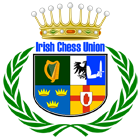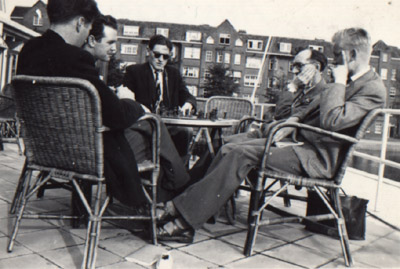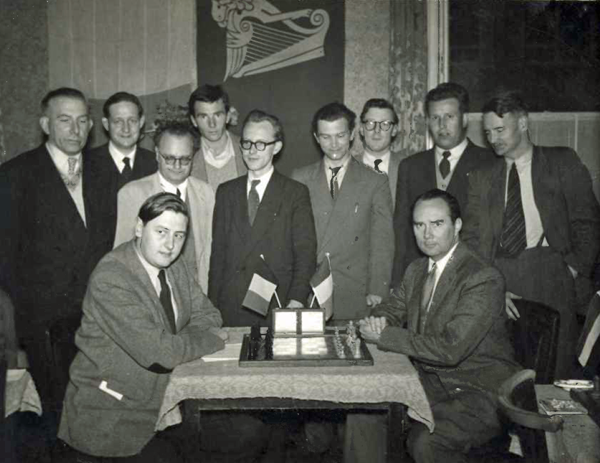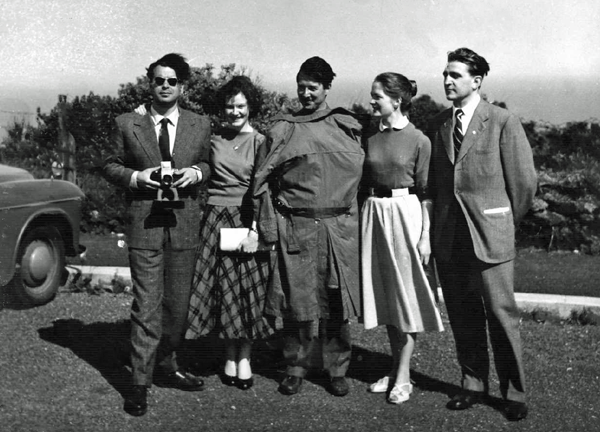Backgound
I was born in Clontarf, Dublin in 1929 and spent the first 31 years of my life there. I attended University College Dublin where I took a BSc in Experimental Physics in 1950 and an MSc two years later having spent time in research and teaching mathematics. From 1952 I was employed as an engineer with the Department of Post and Telegraphs and later with Telecom Eirean. From 1961 (the year of my marriage to Katherine) I have lived and worked in Galway in charge of telecommunications in the western region until my retirement in 1993. I was engaged in foreign assignments in Malaysia (1965), Liberia (1966-7) and again after my retirement in Albania (1994-5). I have four grown-up children (three boys and one girl). My main hobbies are music (playing, listening and organising), book collecting and reading. I play a little tennis and golf and I like to swim and boat in Lake Corrib.
First Love
I fell in love with chess at first sight as a result of picking up a book on chess in a local Dublin library when I was 16 years old. I received a present of a chess set for my 17th birthday a few days after attending my first lectures at UCD. I joined the university chess club, which had just been revived, but took little part in its activities that first year as my father died in early 1947, but I still played the odd game or two with some of my friends.
Clontarf Chess Club
In the winter of 47/48 I, together with my next door neighbour Brian Duignan and my old school friend Liam Brian, decided to start a chess club in Clontarf. We obtained the use of a shed in the grounds of Belgrove School for one night a week. The shed was known as Smokey Joe's. On the first night Brian stood up on a chair and proposed me as secretary. I was much surprised as I did not consider myself as a chess organiser. However, I was elected on the spot and was to remain as a chess organiser for the next 11 years.
The following season we joined the Leinster Chess Union and fielded a team in the Ennis Shield. At first all the players in the Clontarf club were young and inexperienced. We asked a few older people to join and elected them as presidents and vice presidents hoping they might contribute a few pounds to our funds. We swapped Smokey Joe's for a room in a private school, Kostka College, kindly donated free of charge by the owner. For our inaugural meeting I had the bright idea of inviting the world famous physicist Erwin Schrödinger, who happened to be living in Clontarf at that time, to join our club. However, on the appointed evening the owner of the college forgot to turn up and we were locked out. Luckily, however, Schrödinger didn't show up either and a few days later I received a letter from him apologising but agreeing to join the club. He wrote "I do like chess but it has turned out to be not the appropriate relaxation from the work that I am doing". He never did join.
Our first season in the Ennis Shield was not a great success but in the next we came in the top half and in our third season (50/51) we actually won it. By this time we had cast our nets wider and enticed other young enthusiasts into the club including Joe Keenan, Frank Maher and Noel Stewart. We had also discovered that there could be more to a chess club than just chess and recruited lots of girls into the club and organised frequent social occasions. We played home and away friendly matches with other clubs in the Leinster area each of which was an excuse for another social occasion. In those days Clontarf Chess Club vied with the tennis and rugby clubs for the place to be seen.
In 1951 Clontarf Chess Club organised a small international tournament partly held in Belgrave School and partly in the Broadway Cafe in O'Connell Street with R.G.Wade (New Zealand), J.A.Fuller (England) and Irish players from Ulster, Munster and Leinster.
Senior Chess
Clontarf's first season (51/52) of senior chess playing in the Armstrong Cup was very encouraging and we finished near the top of the table. We had now been joined by Ken O'Riordan, Brian Canton and Jim Sadlier and a year later Jim Walsh also came on board. The step up to senior chess did not seem so great. I remember drawing a couple of games with Austin Bourke, the 1951 Irish champion, and one against Michael Schuster, the 1952 Irish champion.
The following year, in order to give more players a chance to play senior chess, a few of us declared to play for UCD. We had always been members of both clubs and Liam Breen and myself had helped UCD to win the Irish Universities championship a couple of times. In the event Clontarf won the Armstrong and UCD were second.
The Irish Chess Union
In 1952 I was elected to the committee of the Leinster Chess Union and I resigned as secretary of the Clontarf Club. Later that winter I was appointed secretary of the Irish Chess Union. The committee consisted of two persons: the president, John O'Hanlon, and the secretary, with the president having the casting vote. Wonderful democracy!
O'Hanlon was nearing 80 years of age. I was 23. He was extremely conservative and thought that the great years of Irish chess had passed thirty years before and was particularly adverse to Irish players taking part in international events. They would make a show of themselves, he said. I, however, had an agenda to spread chess outside the main cities, to organise club and inter-county championships on an all-Ireland basis, to start an Irish chess magazine and to bring Ireland into contact with the outside chess world.
My struggle to get round O'Hanlon took a couple of patient years and deployment of my "disarming smile" (as described by my friend Albert Long of the Ulster Chess Union). First of all I organised a meeting in the Broadway Cafe in Dublin attended by a host of country clubs who were persuaded to demand all-Ireland inter-club and inter-county championships. This was presented to O'Hanlon as a ground-swell demand which he could not easily oppose and I was free to act. We organised the formation of a South Leinster League, an Oriel League (incorporating North Leinster and South Ulster) and a North Ulster League. Winners of the three leagues played off with the winning clubs from Dublin, Belfast, Munster and Connaught for the Irish Club Championship. The inter-county championship was organised on a knock-out basis but excluded players from Dublin, Cork and Belfast cities. Some of the matches were played by telephone and I was able to monitor progress in Dublin in my capacity as a Post and Telegraphs engineer.
At the 1953 ICU general meeting in Galway I argued for the necessity of a treasurer who would also be a member of the committee. My friend Liam Breen was elected. The quiet revolution had been accomplished!
The story of the chess magazine is unusual. I got the idea of a group of enthusiasts printing the magazine by hand. So I got up a subscription fund to buy a small hand-printing press. About 100 people subscribed £1 each and were promised that amount of issues. No money came from the ICU. The name of the magazine was Ficheall, the old name for chess in the Irish Language. The enthusiasm for type-setting did not last long and after three issues it had spent itself. It was clear that a commercial printer would have to be aquired. A further six issues appeared at irregular intervals before the enterprise died. However, a nice printed book of the 1956 An Tóstal Tournament was produced and a mimeographed book of all the games of the 1957 Zonal Tournament were produced and with these the subscribers received their dues.
Hello World
From 1954 contact was re-established with the outside world. I attended FIDE congresses in Amsterdam (1954), Gothenburg (1955), Moscow (1956) and Vienna (1957). Irish teams competed in the Olympiads in Amsterdam (1954) and Moscow (1956). Noel Mulcahy and Donal O'Sullivan represented Ireland in the Munich (1954) and Dublin (1957) Zonal Tournaments, repectively. In the picture, which was taken at the Amsterdam Olympiad, I am second from the left. The others are (from left) Vincent Maher, Jim Walsh, Brian Reilly and Terry Kelly.
McCarthyism
I must mention at this point a further difficulty I had to overcome as regards sending a team to the Moscow Olympiad. The opposition this time came from the Government of the Irish Republic and some staunch conscientious members of the Catholic Church among the chess playing fraternity. Many people will recall the visit of a Yugoslav football team to play a match against Ireland in Dublin some time prior to August 1956 when the Olympiad was due. The Catholic Archbishop of Dublin had issued an edict forbidding Catholics to attend the football game (this was during the McCarthy era in the States). I understand that the match was well attended but no doubt some people stayed away.
In order to attend the Olympiad, Ken O'Riordan and I, who worked in the Government Services, had to apply for special leave without pay from our departments. The precedent for this had been established two years earlier, at least in my case. However, our departments referred the matter to the Department of Foreign Affairs where we were called up for an interview and told a decision would be made in due course. Some weeks later when I phoned the Department I was told the cabinet was due to decide on the issue that very afternoon. The eventual decision was "yes" but it was made at the very top. In the mean time I had had to stop a few journalists who had got wind of the planned trip from writing about it and locate a Catholic Theologian who would give his approval to an Irish team going to play chess in Moscow. I picked a good liberal Jesuit who was pretty sure to say yes and armed with his approval was able to allay the fears of some stalwart members of the chess community.
A Good Russian
Ken rather typically lost his return ticket to Helsinki. I could get by in Russian and handled the arrangements for the rest of the team but when it came time to sort out the missing ticket I couldn't understand a word the ticket collector was saying, so he commandeered one of the English players who could speak Russian to act as translator. However, I managed to signal the Englishman that he too should somehow not understand the point about the number of tickets and so, like a good Russian, the ticket collector soon gave up and let us all through. Later the story went around Dublin that I had smuggled somebody out of Russia.
Bord Fialte
For four years, starting in 1954, we received the generous sponsorship of Bord Fialte (the Irish Tourist Organisation) to hold an international tournament each year in the Republic in connection with the Tóstal Festival (a spring time festival of art, culture and sport). The first three tournaments were all won by the Belgian champion, Alberic O'Kelly de Galway, and were in Dublin (1954), Cork (1955) and Dublin (1956). The image to the left is of the Dublin 1956 An Tostal (full resolution).
The 1957 Zonal
The tournament in 1957 was the big one: the World Championship Zonal Tournament. Planning for this had started in 1954. In 1955 I made a case to Bord Fialte to obtain a much larger sponsorship. While in Gothenberg at the FIDE congress I expected confirmation from them but instead I got a cable saying the matter had not yet been decided. In any case I made a conditional claim to the FIDE meeting but unfortunately so did Spain, so it was decided to defer a decison until the next FIDE meeting in Moscow. Soon after my return I received positive approval from Bord Fialte and passed the news to FIDE headquarters in Stockholm. Later I got a strong indication that the French vice-president of FIDE was trying to get the Zonal for the Spanish so I immediately wrote to the president pointing out that the decision had to await the congress in Moscow. That put a stop to any such shenanigans. I also wrote to all the delegates asking for their support for Ireland. In the end, the Moscow congress decided to draw lots and Ireland won.
There were 7 months to prepare for the Zonal. 1957 was going to be a big year for Irish chess. In the spring there was a Dublin v. Glasgow telephone match. Then, in conjunction with the Zonal, an international match Ireland v. Scotland was organised, together with another An Tóstal International and later a small international in Skerries.
The Zonal itself was rather special as it involved 18 players from 18 countries in an all-play-all lasting three weeks. The venues were the Four Courts Hotel (first two weeks) and Newman House, belonging to UCD. GMs Pachman and Gligoric were the favourites, but Pachman won their individual encounter as early as round 2 and never looked back. On rest days the players were taken on excursions to see some of the countryside round Dublin (see picture right which shows Benko, Gligoric and Stenborg in the company of two Clontarf ladies) and in the evenings there were parties with singing and dancing.
Ants in the Pants
I took Golombek, Dunkelblum and Doda (all of Polish extraction) on a morning trip to the Hill of Howth near Dublin. We sat down to look at the sea and chat. It was a beautiful morning. After a while Dunkelblum whispered to Golombek "What's the English for fourmi?", to which the reply was "Ant". "Well", said Dunkelblum, "I have ants". "You have ants in the pants" said Golombek.
Prague-Vienna-Berlin
After the Zonal Jim Walsh and I went on a holiday first to Prague where we were present at a match between Italy and Czechoslovakia and visited nearby Karlstein in the company of the two teams. Then on to Vienna in Ludek Pachman's car to attend the FIDE congress and finally to Berlin to visit Vincent Maher who was stationed there with the British Army as a doctor. In Vienna we had an amusing experience. On arrival we booked into a small hotel on the Mariahilfer Strasse and went out to a cafe across the street. As in all good cafes in Vienna chess games were in progress and we stopped to watch one. White's next move was O-O-O but he put his king on b1 and rook on c1, whereupon Pachman leaned over politely and placed the pieces as per the official rules. However, all he got for his trouble was a very dirty look from White who placed the pieces back on b1 and c1.
When we were in Prague news broke of Benkö's defection to the USA. Pachman told us that Benkö had tried to escape to the West before (while playing in an East Berlin tournament) with a bundle of useless East German marks. After he left the Dublin Zonal Benkö had asked me to forward a letter he was expecting from America to Luxembourg where he was playing another tournament. He obviously must have got it, but it didn't come through me.
Resigns
Later in 1957 I decided to resign from the ICU. My girlfriend (later my wife), who had done Trojan work during the Zonal preparing the book of the tournament and otherwise helping with the organisation, became ill and was confined to hospital for 6 months. I also found chess was interfering with my work in telecommunications. It took some time before I could disentangle myself, but when I did it was a complete break.



